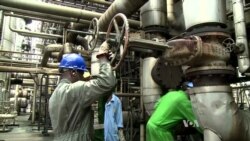Nigeria has more people and more money than any other country in Africa, with much of its wealth coming from one industry: oil.
While the National Bureau of Statistics says oil makes up only about 10 percent of GDP, in reality petroleum plays an outsize role in the economy.
Oil accounts for 69 percent of exports, according to the NBS, and around 70 percent of government revenue.
But after several years at more than $100 per barrel, the price of oil has cratered, falling to under $35, and few analysts expect the price to rise sharply this year.
Though the fall in oil prices is caused mostly by factors beyond Nigeria’s control, it has had a major impact on Nigeria’s economy, and has sent the government of President Muhammadu Buhari scrambling to respond.
“Impact of fall in oil price is, to put it mildly, catastrophic,” said Bismarck Rewane, chief executive of Lagos-based advisory firm Financial Derivatives Company. “In terms of preparedness to deal with the magnitude, we are totally ill-prepared.”
The increase in American oil production and the slowdown in growth by several major Asian economies have been credited with bringing down crude prices.
The effects are already being felt in Nigeria. Economists are cutting growth forecasts, while international investors have called for Nigeria to do as oil producers Russia and Brazil have done and devalue their currency.
The government has resisted those calls, and instead imposed import restrictions and spent its reserves to buoy the naira’s value. Nonetheless, the currency is selling on the black market for about 50 percent less than its official value.
“It really reflects the fact that Nigeria is still very dependent on oil for government revenue, for spending by government, for FX (foreign exchange), for the banks, for the oil companies,” said Dolapo Oni, head of energy research at Ecobank. “So it still reflects the fact that the economy, though it has revived, it’s not well-structured.”
The downturn comes at a crucial time for Buhari’s government. He took office last year, having won election on promises to crackdown on corruption, fight the Boko Haram insurgency in the northeast and build up industries other than oil.
Those promises carry high price tags.
In order to defeat Boko Haram, for instance, Nigeria will have to keep up military pressure against the group, while also rebuilding towns and villages the terrorists have destroyed, and provide jobs and education to people in the impoverished northeast who could otherwise be swayed to join the militants.
The drop in oil hasn’t stopped Buhari from unveiling an ambitious budget proposal that hikes spending by about 25 percent and includes money to renovate Nigeria’s dilapidated infrastructure and give cash grants to poor Nigerians.
The proposed budget calls for the government to borrow about $9 billion. Buhari spokesman Garba Shehu said the government would also look at ways to cut costs and run more efficiently.
As for rebuilding the northeast, Shehu said Nigeria would ask international donors for money.
Nigeria has missed some opportunities to take advantage of low oil prices, while capitalizing on others, Oni said.
The country should be stocking up on crude for when the price goes up in the future. But Nigeria’s refineries don’t have the storage capacity to do that, Oni said.
Oni did credit the government with taking action to overhaul the state-owned Nigerian National Petroleum Corporation and wind down the costly subsidy system that is meant to keep the price of gasoline and diesel low, but has been called prone to graft by anti-corruption campaigners.
“This oil price is actually pushing us to make some reforms,” Oni said.












